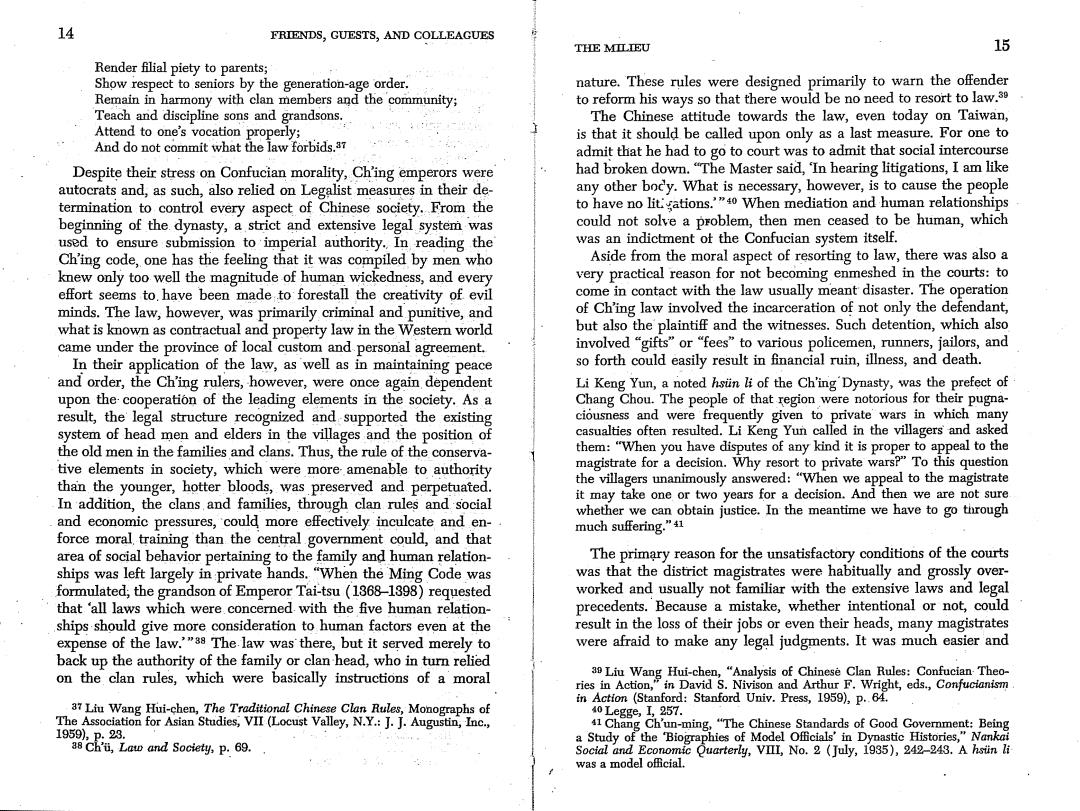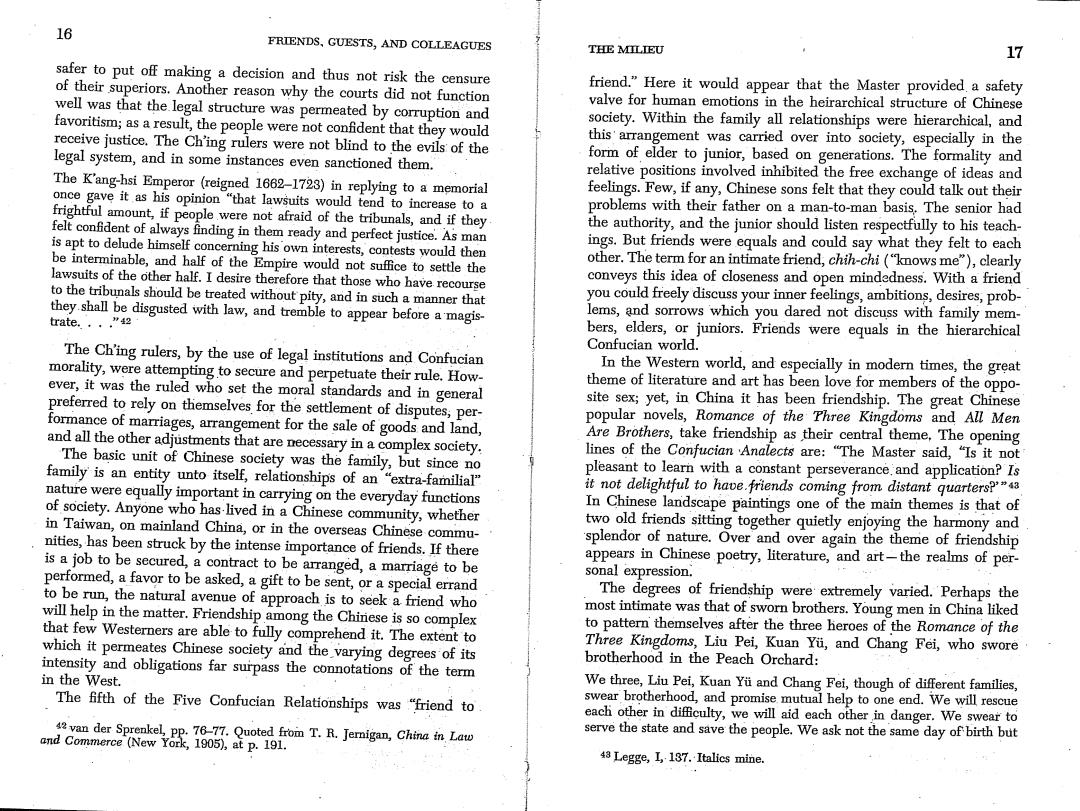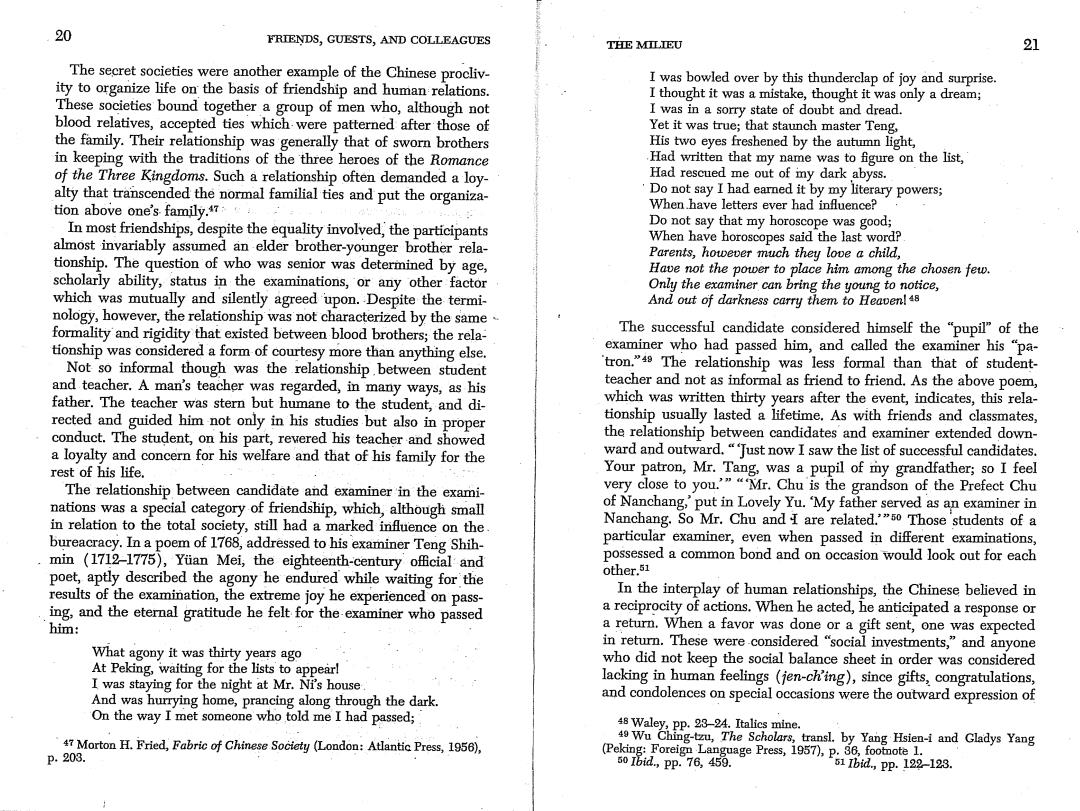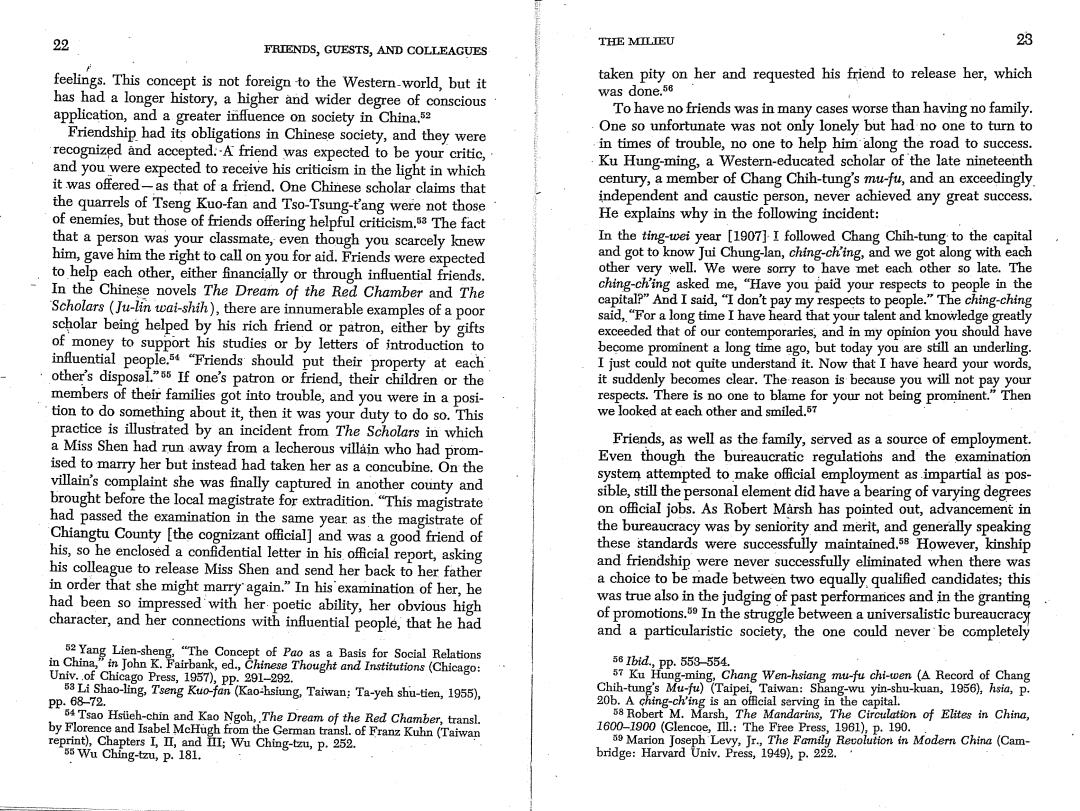
14 FRIENDS,GUESTS,AND COLLEAGUES THE MILIEU 15 Render filial piety to parents; Show respect to seniors by the generation-age order. nature.These rules were designed primarily to warn the offender Remain in harmony with clan members and the community; to reform his ways so that there would be no need to resort to law.30 Teach and discipline sons and grandsons. The Chinese attitude towards the law,even today on Taiwan, Attend to one's vocation properly; is that it should be called upon only as a last measure.For one to And do not commit what the law forbids.37 admit that he had to go to court was to admit that social intercourse Despite their stress on Confucian morality,Ch'ing emperors were had broken down."The Master said,'In hearing litigations,I am like autocrats and,as such,also relied on Legalist measures in their de- any other bocy.What is necessary,however,is to cause the people termination to control every aspect of Chinese society.From the to have no litations.'"40 When mediation and human relationships beginning of the dynasty,a strict and extensive legal system was could not solve a problem,then men ceased to be human,which used to ensure submission to imperial authority.In reading the was an indictment ot the Confucian system itself. Ch'ing code,one has the feeling that it was compiled by men who Aside from the moral aspect of resorting to law,there was also a knew only too well the magnitude of human wickedness,and every very practical reason for not becoming enmeshed in the courts:to effort seems to.have been made to forestall the creativity of evil come in contact with the law usually meant disaster.The operation minds.The law,however,was primarily criminal and punitive,and of Ch'ing law involved the incarceration of not only the defendant, what is known as contractual and property law in the Western world but also the plaintiff and the witnesses.Such detention,which also came under the province of local custom and personal agreement. involved“gifts”"or“fees”to various policemen,.runners,jailors,and In their application of the law,as well as in maintaining peace so forth could easily result in financial ruin,illness,and death. and order,the Ch'ing rulers,however,were once again.dependent Li Keng Yun,a noted hsiin li of the Ch'ing Dynasty,was the prefect of upon the cooperation of the leading elements in the society.As a Chang Chou.The people of that region were notorious for their pugna- result,the legal structure recognized and supported the existing ciousness and were frequently given to private wars in which many system of head men and elders in the villages and the position of casualties often resulted.Li Keng Yun called in the villagers and asked the old men in the families and clans.Thus,the rule of the conserva- them:"When you have disputes of any kind it is proper to appeal to the tive elements in society,which were more amenable to authority magistrate for a decision.Why resort to private wars?"To this question than the younger,hotter bloods,was preserved and perpetuated. the villagers unanimously answered:"When we appeal to the magistrate In addition,the clans and families,through clan rules and social it may take one or two years for a decision.And then we are not sure whether we can obtain justice.In the meantime we have to go through and economic pressures,could more effectively inculcate and en- force moral training than the central government could,and that much suffering."红 area of social behavior pertaining to the family and human relation- The primary reason for the unsatisfactory conditions of the courts ships was left largely in private hands."When the Ming Code was was that the district magistrates were habitually and grossly over- formulated,the grandson of Emperor Tai-tsu(1368-1398)requested worked and usually not familiar with the extensive laws and legal that 'all laws which were concerned.with the five human relation- precedents.Because a mistake,whether intentional or not,could ships should give more consideration to human factors even at the result in the loss of their jobs or even their heads,many magistrates expense of the law.'"The law was there,but it served merely to were afraid to make any legal judgments.It was much easier and back up the authority of the family or clan head,who in turn relied on the clan rules,which were basically instructions of a moral 3 Liu Wang Hui-chen,"Analysis of Chinese Clan Rules:Confucian Theo- ries in Action,"in David S.Nivison and Arthur F.Wright,eds.,Confucianism in Action (Stanford:Stanford Univ.Press,1959),p..64. 37 Liu Wang Hui-chen,The Traditional Chinese Clan Rules,Monographs of The Association for Asian Studies,VII (Locust Valley,N.Y.:J.J.Augustin,Inc., 40 Legge,I,257. 41 Chang Ch'un-ming,"The Chinese Standards of Good Government:Being 1959),P.23. a8 Ch'ti,Law and Society,p.69. a Study of the Biographies of Model Officials'in Dynastic Histories,"Nankai Social and Economic Ouarterly,VIIL,No.2 (July,1935),242-243.A hstin li was a model official

16 FRIENDS,GUESTS,AND COLLEAGUES THE MILIEU 17 safer to put off making a decision and thus not risk the censure of their superiors.Another reason why the courts did not function friend."Here it would appear that the Master provided.a safety well was that the legal structure was permeated by corruption and valve for human emotions in the heirarchical structure of Chinese favoritism;as a result,the people were not confident that they would society.Within the family all relationships were hierarchical,and receive justice.The Ch'ing rulers were not blind to the evils of the this'arrangement was carried over into society,especially in the legal system,and in some instances even sanctioned them. form of elder to junior,based on generations.The formality and The K'ang-hsi Emperor(reigned 1662-1723)in replying to a memorial relative positions involved inhibited the free exchange of ideas and once gave it as his opinion "that lawsuits would tend to increase to a feelings.Few,if any,Chinese sons felt that they could talk out their frightful amount,if people were not afraid of the tribunals,and if they problems with their father on a man-to-man basis.The senior had felt confident of always finding in them ready and perfect justice.As man the authority,and the junior should listen respectfully to his teach- is apt to delude himself concerning his own interests,contests would then ings.But friends were equals and could say what they felt to each be interminable,and half of the Empire would not suffice to settle the other.The term for an intimate friend,chih-chi("knows me"),clearly lawsuits of the other half.I desire therefore that those who have recourse conveys this idea of closeness and open mindedness.With a friend to the tribunals should be treated without pity,and in such a manner that you could freely discuss your inner feelings,ambitions,desires,prob- they.shall be disgusted with law,and tremble to appear before a'magis- lems,and sorrows which you dared not discuss with family mem- trate.,,”42 bers,elders,or juniors.Friends were equals in the hierarchical The Ch'ing rulers,by the use of legal institutions and Confucian Confucian world. morality,were attempting to secure and perpetuate their rule.How- In the Western world,and especially in modern times,the great ever,it was the ruled who set the moral standards and in general theme of literature and art has been love for members of the oppo- preferred to rely on themselves for the settlement of disputes,per- site sex;yet,in China it has been friendship.The great Chinese formance of marriages,arrangement for the sale of goods and land, popular novels,Romance of the Three Kingdoms and All Men and all the other adjustments that are mecessary in a complex society. Are Brothers,take friendship as their central theme,The opening The basic unit of Chinese society was the family,but since no lines of the Confucian Analects are:"The Master said,"Is it not family is an entity unto itself,relationships of an "extra-familial" pleasant to learn with a constant perseverance.and application?Is nature were equally important in carrying on the everyday functions it not delightful to have.friends coming from distant quarters?"43 of society.Anyone who has lived in a Chinese community,whether In Chinese landscape paintings one of the main themes is that of in Taiwan,on mainland China,or in the overseas Chinese commu- two old friends sitting together quietly enjoying the harmony and nities,has been struck by the intense importance of friends.If there splendor of nature.Over and over again the theme of friendship is a job to be secured,a contract to be arranged,a marriage to be appears in Chinese poetry,literature,and art-the realms of per- performed,a favor to be asked,a gift to be sent,or a special errand sonal expression. to be run,the natural avenue of approach is to seek a friend who The degrees of friendship were extremely varied.Perhaps the will help in the matter.Friendship among the Chinese is so complex most intimate was that of sworn brothers.Young men in China liked that few Westerners are able to fully comprehend it.The extent to to pattern themselves after the three heroes of the Romance of the which it permeates Chinese society and the varying degrees of its Three Kingdoms,Liu Pei,Kuan Yu,and Chang Fei,who swore intensity and obligations far surpass the connotations of the term brotherhood in the Peach Orchard: in the West. We three,Liu Pei,Kuan Yui and Chang Fei,though of different families, The fifth of the Five Confucian Relationships was "friend to swear brotherhood,and promise mutual help to one end.We will rescue each other in difficulty,we will aid each other in danger.We swear to 42 van der Sprenkel,pp.76-77.Quoted from T.R.Jernigan,China in Law and Commerce (New York,1905),at p.191. serve the state and save the people.We ask not the same day of birth but 43 Legge,I,137.Italics mine

18 THE MILIEU 19 FRIENDS,GUESTS,AND COLLEAGUES we seek to die together.May Heaven,the all-ruling,and Earth,the all- successful in the examinations had the further bond of common producing,read our.hearts,and if we turn aside from righteousness or achievement.Of the literally thousands of students who took the forget kindliness may Heaven and man smite us.44 examinations,only a small percentage passed and,as in any human situation,not all of them became real friends.Nevertheless,to have This oath provided the pattern for most of those which young men passed the examinations in the same year,even though no real used in swearing brotherhood.The oath was also usually sworn to friendship was formed,still created a special affiliation.As.with in a temple,shrine,or some other place of significance to the other types of friendship these too were subject to proliferation. participants. The sons of classmates had a special relationship to their fathers' The terminology for friendship is also illuminating:chiao-ch'ing, classmates;and the near relatives of a successful candidate would meaning extremely close friendship,is composed of characters mean- not only share in his glory but also in his friendships.35 ing"to have intercourse or intimacy"and"the affections,feelings, People from the same village or the same province,when out of or desires."What is translated as "a firm and noble-minded friend- their native area,felt a special affinity and loyalty to one another ship,"tao-i chin-shih chih chiao,carries the implications of public on the basis of their common nativity.As a result they would band and private morality and the firmness of minerals and rock. together in special provincial clubs (hui-kuan)for mutual support In addition to direct friendship,which one contracted for oneself, and companionship.Candidates from the same province who went there was a whole range of indirect ones.The friends of friends up to Peking for the examinations would lodge together in their would fall into this category,as would the friends of a father and respective provincial clubs;there they would receive help in prepar- the sons of friends.Although the relationship was originally created ing for the examinations and,if in need,financial assistance.Mer- by others,friendships of this nature could become intimate and last- chants on business in Peking would also lodge at these clubs.While ing,depending on the interests and personalities of the participants. the composition of the clubs in the capital was mainly of a scholarly A special class of friendship was that of "tung-ism."The char- nature,in the other major centers of China,such as the provincial acter tung,which means“together”or“the same,”has been applied capitals and commercial centers,the merchants predominated,How- as an adjective to many nouns in Chinese to describe the various ever officials whose duties led them away from their home provinces categories of this particularly Chinese brand of friendship-tung- would also participate in the activities of their provincial club.40 hsiang (same village),t'ung-sheng (same province),t'ung-hsteh This loyalty to and feeling of pride in one's home region permeated (students together),tung-nien(same year [graduates],classmates), Chinese society and added one more facet to the complex world and so on.Probably the most important of these for the educated of human relationships. class was that of t'ung-nien. At the local level,the members of the same profession or occu- Those successful candidates at any particular examination,whether pation would form guilds,as would strangers to the area who came it was prefectural,provincial,or metropolitan,considered themselves from the same region and pursued the same occupation.Some of as classmates.Under the Ch'ing system of education much of the these guilds had branches in other parts of China and thus their real work of preparation for the examinations was done under private members would create a network of friendships based on the ties teachers or tutors,despite the government-sponsored schools.Be- of common occupation and regional affinity.The Shansi bankers, cause of this,the criteria for "classmate"was not whether you had who practically monopolized the transfer of funds in China prior attended the same school and had graduated together,as we think to the advent of Western-type banking,are only one example of of it today,but whether you had passed the same imperial examina- this phenomenon. ion.During the course of the preparation,friendships were formed on the basis of common experience and interests.Those who were 45 Arthur Waley,Yuan Mei,Eighteenth Century Chinese Poet.(London: George Allen and Unwin,Ltd.,1956),.p.26. 44Lo Kuan-chung,Romance of the Three Kingdoms,transl.by C.H.Brewitt- 4e Hosea Ballou Morse,The Gilds of China (London:Longmans,Green and 'aylor(Rutland,Vermont and Tokyo:Charles E.Tuttle Company,1959),I,5-6. Co.,1909),pp.35-37;van der Sprenkel,p.90

20 FRIENDS,GUESTS,AND COLLEAGUES THE MILIEU 21 The secret societies were another example of the Chinese procliv- ity to organize life on the basis of friendship and human relations. I was bowled over by this thunderclap of joy and surprise. I thought it was a mistake,thought it was only a dream; These societies bound together a group of men who,although not I was in a sorry state of doubt and dread. blood relatives,accepted ties which were patterned after those of Yet it was true;that staunch master Teng, the family.Their relationship was generally that of sworn brothers His two eyes freshened by the autumn light, in keeping with the traditions of the three heroes of the Romance Had written that my name was to figure on the list, of the Three Kingdoms.Such a relationship often demanded a loy- Had rescued me out of my dark abyss. alty that transcended the normal familial ties and put the organiza- Do not say I had earned it by my literary powers; tion above one's.family.47 When.have letters ever had influence? In most friendships,despite the equality involved,the participants Do not say that my horoscope was good; almost invariably assumed an elder brother-younger brother rela- When have horoscopes said the last word? tionship.The question of who was senior was determined by age, Parents,however much they love a child, Have not the power to place him among the chosen few. scholarly ability,status in the examinations,or any other factor Only the examiner can bring the young to notice, which was mutually and silently agreed upon.Despite the termi- And out of darkness carry them to Heaven!48 nology,however,the relationship was not characterized by the same.. formality and rigidity that existed between blood brothers;the rela- The successful candidate considered himself the "pupil"of the tionship was considered a form of courtesy more than anything else. examiner who had passed him,and called the examiner his "pa- Not so informal though was the relationship between student tron.4 The relationship was less formal than that of student- and teacher.A man's teacher was regarded,in many ways,as his teacher and not as informal as friend to friend.As the above poem, father.The teacher was stern but humane to the student,and di- which was written thirty years after the event,indicates,this rela- rected and guided him not only in his studies but also in proper tionship usually lasted a lifetime.As with friends and classmates, conduct.The student,on his part,revered his teacher and showed the relationship between candidates and examiner extended down- a loyalty and concern for his welfare and that of his family for the ward and outward."'Just now I saw the list of successful candidates. rest of his life. Your patron,Mr.Tang,was a pupil of my grandfather;so I feel The relationship between candidate and examiner in the exami- very close to you.'""Mr.Chu is the grandson of the Prefect Chu nations was a special category of friendship,which,although small of Nanchang,'put in Lovely Yu.My father served as an examiner in in relation to the total society,still had a marked influence on the Nanchang.So Mr.Chu and I are related.'"50 Those'students of a bureacracy.In a poem of 1768,addressed to his examiner Teng Shih- particular examiner,even when passed in different examinations, min (1712-1775),Yuian Mei,the eighteenth-century official and possessed a common bond and on occasion would look out for each poet,aptly described the agony he endured while waiting for the other.51 results of the examination,the extreme joy he experienced on pass- In the interplay of human relationships,the Chinese believed in ing,and the eternal gratitude he felt for the examiner who passed a reciprocity of actions.When he acted,he anticipated a response or him: a return.When a favor was done or a gift sent,one was expected in return.These were considered "social investments,"and anyone What agony it was thirty years ago At Peking,waiting for the lists to appearl who did not keep the social balance sheet in order was considered I was staying for the night at Mr.Ni's house lacking in human feelings(jen-ch'ing),since gifts,congratulations, And was hurrying home,prancing along through the dark. and condolences on special occasions were the outward expression of On the way I met someone who told me I had passed; 48 Waley,pp.23-24.Italics mine. 47 Morton H.Fried,Fabric of Chinese Society (London:Atlantic Press,1956), 49 Wu Ching-tzu,The Scholars,transl.by Yang Hsien-i and Gladys Yang p.203. (Peking:Foreign Language Press,1957),p.36,footnote 1. 60bid,Pp.76,459. 11bid,pp.122-123

22 THE MILIEU 23 FRIENDS,GUESTS,AND COLLEAGUES feelings.This concept is not foreign to the Western-world,but it taken pity on her and requested his friend to release her,which has had a longer history,a higher and wider degree of conscious was done.5e application,and a greater influence on society in China.53 To have no friends was in many cases worse than having no family. Friendship had its obligations in Chinese society,and they were One so unfortunate was not only lonely but had no one to turn to recognized and accepted.A friend was expected to be your critic, in times of trouble,no one to help him along the road to success. and you were expected to receive his criticism in the light in which Ku Hung-ming,a Western-educated scholar of the late nineteenth it was offered-as that of a friend.One Chinese scholar claims that century,a member of Chang Chih-tung's mu-fu,and an exceedingly the quarrels of Tseng Kuo-fan and Tso-Tsung-t'ang were not those independent and caustic person,never achieved any great success. of enemies,but those of friends offering helpful criticism.53 The fact He explains why in the following incident: that a person was your classmate,even though you scarcely knew In the ting-wei year [1907]I followed Chang Chih-tung to the capital him,gave him the right to call on you for aid.Friends were expected and got to know Jui Chung-lan,ching-ch'ing,and we got along with each to help each other,either financially or through influential friends. other very well.We were sorry to have met each other so late.The In the Chinese novels The Dream of the Red Chamber and The ching-ch'ing asked me,"Have you paid your respects to people in the Scholars(Ju-lin wai-shih),there are innumerable examples of a poor capital?"And I said,"I don't pay my respeets to people."The ching-ching scholar being helped by his rich friend or patron,either by gifts said,"For a long time I have heard that your talent and knowledge greatly of money to support his studies or by letters of introduction to exceeded that of our contemporaries,and in my opinion you should have become prominent a long time ago,but today you are still an underling. influential people.4 "Friends should put their property at each I just could not quite understand it.Now that I have heard your words, other's disposal."55 If one's patron or friend,their children or the it suddenly becomes clear.The reason is because you will not pay your members of their families got into trouble,and you were in a posi- respects.There is no one to blame for your not being prominent."Then tion to do something about it,then it was your duty to do so.This we looked at each other and smiled.57 practice is illustrated by an incident from The Scholars in which a Miss Shen had run away from a lecherous villain who had prom- Friends,as well as the family,served as a source of employment. ised to marry her but instead had taken her as a concubine.On the Even though the bureaucratic regulations and the examination villain's complaint she was finally captured in another county and system attempted to make official employment as impartial as pos- brought before the local magistrate for extradition."This magistrate sible,still the personal element did have a bearing of varying degrees had passed the examination in the same year as the magistrate of on official jobs.As Robert Marsh has pointed out,advancement in Chiangtu County [the cognizant official]and was a good friend of the bureaucracy was by seniority and merit,and generally speaking his,so he enclosed a confidential letter in his official report,asking these standards were successfully maintained.ss However,kinship his colleague to release Miss Shen and send her back to her father and friendship were never successfully eliminated when there was in order that she might marry again."In his examination of her,he a choice to be made between two equally qualified candidates;this had been so impressed with her poetic ability,her obvious high was true also in the judging of past performances and in the granting character,and her connections with influential people,that he had of promotions.59 In the struggle between a universalistic bureaucracy and a particularistic society,the one could never be completely 52Yang Lien-sheng,"The Concept of Pao as a Basis for Social Relations in China,"in John K.Fairbank,ed.,Chinese Thought and Institutions(Chicago: 6Ibid,pp.553-554 Univ.of Chicago Press,1957),pp.291-292. 57 Ku Hung-ming,Chang Wen-hsiang mu-fu chi-wen(A Record of Chang 53 Li Shao-ling,Tseng Kuo-fan(Kao-hsiung,Taiwan:Ta-yeh shu-tien,1955), Chih-tung's Mu-fu)(Taipei,Taiwan:Shang-wu yin-shu-kuan,1956),hsia,p. PP.68-72. 20b.A ching-ch'ing is an official serving in the capital. 54 Tsao Hstieh-chin and Kao Ngoh,The Dream of the Red Chamber,transl. 58 Robert M.Marsh,The Mandarins,The Circulation of Elites in China, by Florence and Isabel McHugh from the German transl.of Franz Kuhn (Taiwan 1600-1900 (Glencoe,Ill.:The Free Press,1961),p.190. reprint),Chapters I,I,and III;Wu Ching-tzu,p.252. 59 Marion Joseph Levy,Jr.,The Family Revolution in Modern China(Cam- 55 Wu Ching-tzu,p.181. bridge:Harvard Univ.Press,1949),p.222